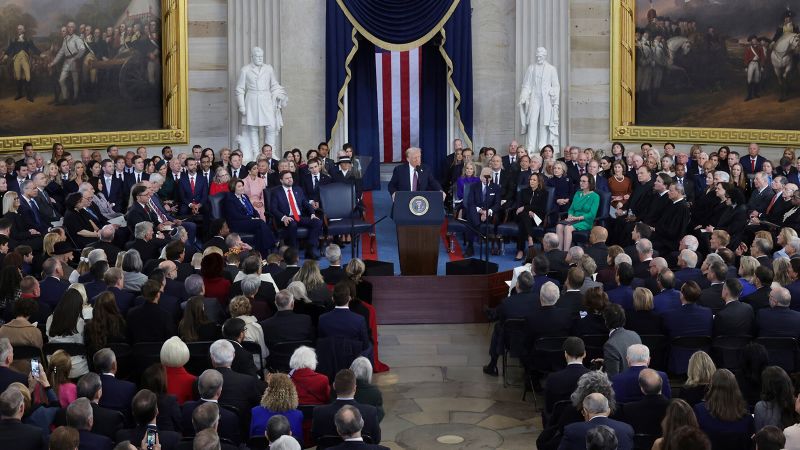The recent fundraising efforts by President Donald Trump’s inaugural committee have brought to light the immense financial dynamics surrounding presidential inaugurations. This year’s committee managed to collect an impressive sum of $239 million to fund the events surrounding Trump’s swearing-in, setting a remarkable benchmark that far surpassed the previous records. Specifically, this haul dwarfed the $107 million raised for Trump’s 2017 inauguration and was nearly four times the approximately $62 million his predecessor, Joe Biden, raised for a considerably scaled-down inauguration during the Covid-19 pandemic in 2021.
A significant contributor to Trump’s inaugural funding was the Colorado-based poultry giant, Pilgrim’s Pride, which made a hefty donation of $5 million. Other substantial contributions came from the cryptocurrency industry, with Ripple Labs contributing nearly $4.9 million and Robinhood, a trading platform, adding another $2 million to the pot. These figures not only highlight the importance of wealthy individuals and corporations in political financing but also showcase a growing trend of investments from sectors that have a vested interest in government decisions.
Moreover, many of the prominent donors have secured influential roles within the Trump administration. For instance, Warren Stephens, an Arkansas financier, who donated $4 million, has been nominated as the U.S. ambassador to the United Kingdom. Similarly, billionaire Jared Isaacman, who contributed $2 million, is awaiting Senate confirmation to head NASA. This blurred line between contributions and access to power raises ethical questions about the implications of such fundraising practices, indicating a direct connection between financial support and governmental roles.
The fundraising report revealed that over 60% of the committee’s revenue came from more than 130 donations of $1 million or more, emphasizing the dominant influence of affluent donors in shaping the pomp and circumstance of presidential inaugurations. The Federal Election Commission’s regulations stipulate that inaugural committees cannot accept foreign donations but place no cap on individual contributions. Consequently, various corporations from different sectors have eagerly opened their wallets. High-profile donation sources such as Meta and Amazon have each donated $1 million, ensuring that their executives garnered prime seating during the inauguration ceremony held in the historic Capitol Rotunda.
Max Stier, president and CEO of the nonpartisan Partnership for Public Service, voiced concerns regarding the escalating amounts being raised for inaugural events. He suggested that the growing sums reflect a mechanism whereby wealthy interests can exert influence over newly elected officials through financial contributions, underscoring the need for more transparency and regulation regarding funding.
As part of the inaugural organization, the Trump Vance Inaugural Committee reported collecting nearly $245.3 million while refunding some $6 million in donations. A deadline for disclosing significant donations was reached 90 days after the inauguration, prompting some questions regarding the committee’s spending and the future allocation of leftover funds. Typically, these reports only provide a partial picture of the financial situation since detailed expenditure information isn’t necessarily required.
There are indications that surplus donations may eventually support Trump’s presidential library initiative—a project for which he is actively raising funds. Notably, several prominent figures within the tech and financial sectors, including OpenAI CEO Sam Altman and hedge fund manager Paul Singer, made individual contributions of $1 million to the inaugural committee. These donations can raise eyebrows, especially since several donors appear to have significant interests poised before the federal government, potentially blurring the ethical lines of political financing.
In response to the increasingly blurred boundaries between political contributions and access to power, advocates, including former aides to past presidents, have called for federal legislation to impose greater disclosure and spend transparency requirements on inaugural funds. Measures proposed include bans on the personal use of inaugural donations and mandates that any leftover contributions go to recognized charities. Such proposals reflect a growing concern among lawmakers and political watchdog organizations that reform is needed to curb the influence of money in politics.
In contrast to previous inaugurations, such as President Barack Obama’s first ceremony, which raised overlapping sums and adequately financed a historically large event, Trump’s second inauguration raised levels that exceed expectations for merely hosting inauguration-related celebrations. Democratic party figures and organizations continue to seek the implementation of restrictions to safeguard the integrity of the political process against undue influence from wealthy donors. Given the scrutiny that Trump’s inaugural spending has already attracted—culminating in an investigation by the Washington, D.C. attorney general related to improper financial practices—this ongoing discussion about campaign finance is likely to develop further in public discourse.



